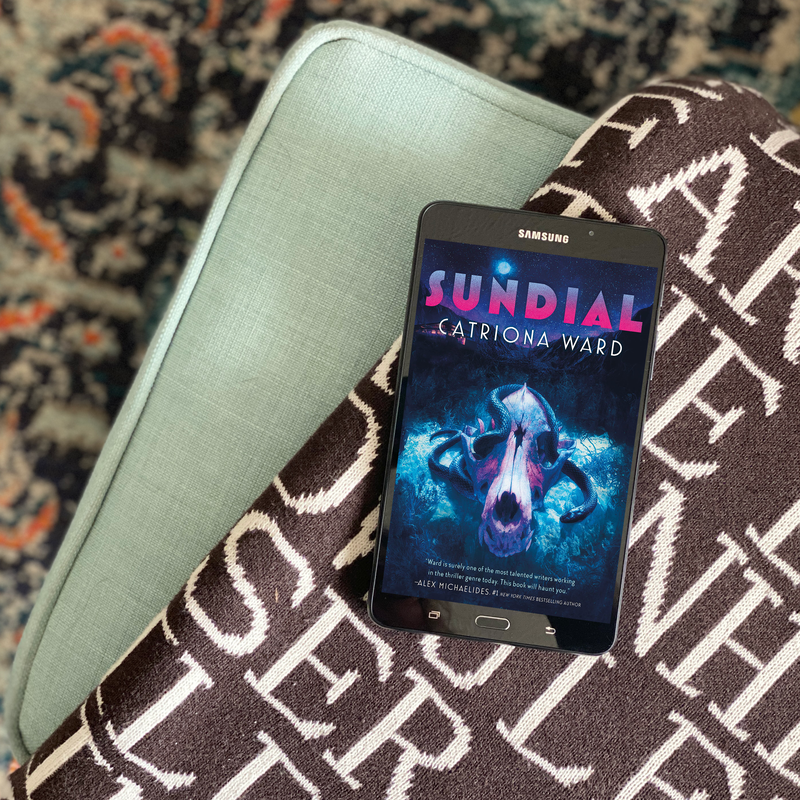|
3.5 stars
Previous fans of Rory Power are in for an adjustment, and the rest are also in for an interesting time. This adult fantasy was a combination of intense setup, rich worldbuilding, uneven pacing, and a unique sense of character. I feel mixed about it...but at the end of the day, positive? I'll do my best to unpack my feelings here. Sense of place: ★★★ Pacing: ★★ for the first half, higher for the second half Character arcs: ★★ 1/2 Enjoyment: ★★★ 1/2 Twins Rhea and Lexos have grown up over the course of a century with a unique set of powers. As a part of this world's ruling class of elite families, the twins' father, Baba, owns several of the world's various magical gifts and has bequeathed them to his children as needed. Rhea controls the passing of the seasons with her seasonal consort sacrifices, while Lexos stitches the constellations in the night sky each night and handles the ocean's tides. In their seat of power, the twins, Baba, and their two younger siblings have ruled their small territory with an iron fist for over a century. The magical gifts of each ruling family pass along to subsequent family members in a patriarchal line of succession—unless someone comes along and murders the whole family and takes the gifts for himself—like Baba did. This mythic and heavily Greek-inspired fable feels epic in scope from the start, with one sibling painting the colors of the garden to color in the plants of the realm and another building mechanical animals that manifest as real beings elsewhere. And that's just the tip of the iceberg for this world's grasp of magic. High concepts of magic are at their best here. Rhea and Lexos are the heart of this novel. Their two points of view carry us through this sprawling epic of political intrigue, toxic families, and cultural influences. A serious dose of ancient Greek carries through into the political structure of this novel—and by serious, I mean SERIOUS, as a non-Greek academic I found this element unnecessarily confusing to grasp—while in other aspects of this novel popular book concepts peek out from the shadows in some of the side adventures and softer plot sides. It's an interesting story set in a very confusing world and tied to a classic twist on a basic plot: how far will you go for family, and when do you choose yourself? Ultimately, I found In A Garden Burning Gold to be a confusing mesh of too much and too little at the same time. Too much: Reliance on the reader's knowledge of Greek influence. As mentioned above, if you are not familiar with the political intricacies of ancient Greek systems, the first half of the book is unnecessarily confusing and puts you immediately on the back foot. It also makes the first half of the book an absolute slog, as that half is almost entirely setup and politics. The author does work on explaining it for the average reader, but it was hard and I was aware that I was missing a few tricks right off the top. An unfortunately frustrating element for me. Too little: Sense of authenticity in the family interactions. This is not a spoiler for significant events, but I will say that for siblings who have coexisted with each other in their family estate for almost 100 years, they do not feel like it. They don't understand each other, there are fundamental divides in their ability to communicate on even the basest of levels. They are also 100% reliant on their relationship with their toxic father to dictate how they interact with each other. It felt like no other family dynamic I've ever seen (positive or negative) and it made the family seem more like distant relatives that happened to be cohabitating as opposed to actual flesh and blood siblings. Siblings know each other, regardless of how the parent tries to manipulate the relationship(s). Even if its a toxic vibe, siblings know each other. I also struggled with some of the plot reveals and character arcs, if I'm honest. Rhea's naivety bothered me, Lexos' inability to separate his sense of worth from his father and their family status seemed static and only gained dynamism toward the end. This is clearly a story that is going somewhere, and I can feel it's going to be epic, but given our starting point the entry into the world was a harder read to enjoy. The ending was fantastic though... I think book two is going to rise from the foundations of this one with a lot of improvement given where we finally got our characters to be. Looking forward to continuing. Thank you to Del Rey for my copy in exchange for an honest review.
0 Comments
2.5 stars
An ominous, snail-paced crawl to the finish line with a lot of hidden horror and an ambiguously dark ending. This was interesting, but soooo not for me. (Take the star rating with a grain of salt.) Concepts: ★★★★ Pacing: ★ Reveal(s): ★★★ Enjoyment: ★ First off, I'd like to say that my low rating is 100% tied to my personal feelings for this novel's content and my general reading experience. I think, like most horror novels, how we respond to content warnings and plot points are very much dependent on individual reader preferences—and it's hard to know what you're getting into without spoiling yourself to a book's contents. Sundial was one of those reads for me—if I'd known where the plot was going to go when I started reading, I would have passed on it. (For that reason, I think some people who aren't excited by the book's pitch but do like certain horror tropes would love this book. But they'll have a hard time learning that without knowing details beforehand. A conundrum that often exists in this genre. ) But hey, we're here now, and I am going to do my best to sell this very well-told story that did not work for me, personally. Rob's life as a suburban mom of two daughters looks great on the surface. Her husband has money and is respected, her job is stable and conservatively appropriate, and her two daughters appear to be beautiful and normal. This is a horror novel, so I'll stop there with how things "appear" to be. Rob's hiding behind several of her secrets, and her husband, Irving, isn't much better. Come to think of it, her oldest daughter, Callie, and her youngest daughter, Annie, also have their secrets. This is a family bound in their silence and (badly) hiding behind the cracks. The façade is crumbling, and Rob's about to realize that there's nothing she can do to reverse the damage—it's time to do damage control. And for Rob, the only thing that makes sense is to return to the start of everything--Sundial. An isolated compound in the middle of the Mojave desert, Sundial is where Rob grew up. It's an odd place—almost cult-like—with more scientific experiments and death than most of us can imagine. Her family is bizarre, her upbringing strange. Rob's childhood and its secrets lay buried in the dirt along with the truth. Rob grabs her oldest daughter, Callie, and flees to Sundial to fix the problem. (What is the problem though, exactly? Is it what Rob thinks it is? Is it was Callie thinks it is? Is it even what we, the readers, think it is?) Told through split POVS, split timelines, and interspersed with story entries of a fictional world, one thing is true for this novel—the story is never solid. Sundial is a very interesting concept for a novel. It takes many pieces from other stories, and its display of the truth/reveals held a classic "twist" flavor to it that made sense when looking at the entire novel from a bird's eye view. (In practice, it led to a very frustrating reading experience.) As the reader, I was so frustrated by the stilted, distanced gaze. All of these characters felt like they were permanently behind a glass wall—sounds and pictures came through just fine, but I could never forget that there was a wall between us. I was so aware of the story being a "story" the entire time. I also think that without foreknowledge of the ending, the entire first half of the book feels like a snail crawl. I didn't know what was happening, not enough action was carrying me through the confused intro stage, and I was so aware of the metaphorical wall between character vs. reader that my connection to the characters didn't exist. There was nothing tying me to continuing this story beyond the sense of duty I had as a book reviewer to complete my read of an advance reader copy. Personal issues aside, I do think Sundial excelled in its sense of place and setting. The desert compound that the book takes its title from is grounded in gritty realities and horrors that felt as real and oppressive as a desert heat. The horrors within this book had a unique backdrop in Sundial's sense of place, and the animal elements were different than other horror novels I've personally read. The unique factor is strong here—genre readers will no doubt appreciate that. I think all fans of horror should consider picking this up, especially if my cons don't seem like cons above... this is definitely an interesting and unique entry into a genre that is brutally exacting in its demands for new content. |
Amy Imogene ReadsJust someone looking for her own door into Wonderland. Categories
All
Archives
July 2024
|



 RSS Feed
RSS Feed
